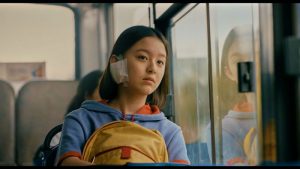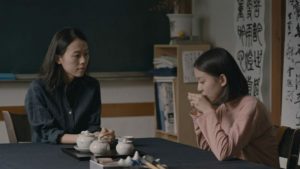QUICK SNAP: LIVE FROM TALLINN
The Summer of 1987. Nicole (Maddy Martin), Veronica (Jenna Warren), Amber (Sadie Rose), Sara (Madison Baines); four rural girls on the verge of womanhood, having their periods for the first time. Nicole hasn’t yet got over the death of her older brother Seamus, killed by an accident with a thresher. She’s so wrapped up in this, and in generally being a teenager, that she fails to spend much time with her little brother Brendan.
Her tomboy best friend Veronica spends her time bunking off household chores demanded by her hard-drinking, authoritarian father Gavin (Joe Bostick) and seems to be constantly pushing boundaries. Plus-sized Amber seems timid and easily frightened, and is subject to sporadic bullying by Veronica, yet is a dark horse capable of a shocking practical joke or unexpected, anti-social behaviour.
We never find out that much about Sara beyond that she’s embarrassed by her conservative, aerobics-obsessed mum (Measha Brueggergosman). She’s most definitely the fourth character with Nicole as the main protagonist, Veronica as the second and Amber as the third, in that hierarchical order (was it that way in the script?) And while Veronica’s father Gavin remains largely a dark, troubling figure in the background, we see quite a bit more of Nicole’s family life and parents.
Her dad Dale (Aaron Poole) is out of work and can’t seem to find a job anywhere, although he appears to be actively looking, at least some of the time. Dissatisfied with her husband’s lack of progress on this front, wife May (Miranda Calderon) goes out and gets a job with the company building homes in the area, Happy Haven Development – much to Dale’s disgust.
Meanwhile the four girls (initially five, but one has a run in with Veronica and walks away early on) move in to Nicole’s family’s former home, now abandoned and dilapidated. This is a summer childhood game rather than anything with any legal standing, and at various points they find the front door and windows boarded up with Happy Haven warnings of private property, impending development and no trespassing, which signs are cheerfully pulled down by the bravura Veronica and others.
It’s also an excuse for Nicole to move into her late brother’s room, where she frequently sees and talks to Seamus (Kyle Meagher), who never talks back, asking him questions like, what’s it like to be dead? This aspect of a teenager dealing with sibling bereavement is nicely handled, even if it at one point tips over into the conceit of seeing him standing upside down on the ceiling and her walking up the side of the wall to stand beside him, a competent visual effects job even if one’s not exactly sure what the writer director is trying to say at this point.
That moment is representative of the whole film: it’s constantly going off in different directions and, having established the four girls in their illicit summer property, throws in myriad scenes and plot strands without seeming to know what it’s about or where it’s going. To have two characters driving around a cornfield in an old car may look good, but it doesn’t seem to take the story anywhere and delivers little more than an excuse to play a striking music track in Joy Division’s Love Will Tear Us Apart, which doesn’t really add anything beyond immediate, gratuitous, foot-tapping adrenaline rush. Likewise in another scene which throws in Brian Eno’s Babies On Fire. Fabulous music – but why is it here?
This means that final reel attempts to close the narrative feel forced, and even then there are too many such attempts going on at once. A shame that the film can’t make up its mind quite what story it wants to tell (out of several on offer), because the competing narratives are all pretty interesting. Such a shame these problems couldn’t have been fixed at script stage, because the performances have a natural feel while writer-director Pye appears to have genuine vision, albeit unfocused.
As for the title – one character (singular) commits arson towards the end. The is no group of arsonists (plural). Happy Haven or Happy Haven Development might have made a much better title, because all the ideas floating around here seem to relate to the happiness (or otherwise) of the home environment.
The Young Arsonists plays in the Tallinn Black Nights Film Festival. It is part of the brand new Critics’ Picks strand.













